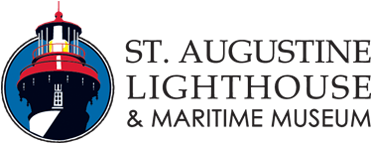The St. Augustine Lighthouse Maritime Archaeological Program field season with students is coming to a close. As they prepare to leave our site, our town and their newly-forged friends, they have written a few parting words about the experience we call field school. This week’s blog entry will read more like diary entries, with some full entries and some snippets, all of which together will hopefully provide insight into the student perspective. At the end of the entries, there is a bit of information on the program and its mission. For any students out there, we always encourage you to do your research when it comes to internships, post-graduate programs, experientials and other resume builders. Digging a little deeper to find something that meets your needs and your career plan usually produces rewarding results.
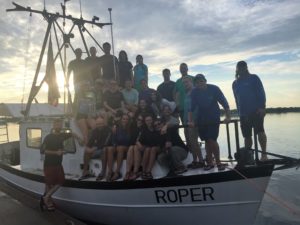
Group photo of field school students at the close of the 2017 season.
Mesfer Alqahtani
The LAMP program helped me to learn and practice the basic and essential skills for underwater excavation. Some of the skills I learned: doing the circle research to find a site; laying basic lines; diving with poor visibility; using a compass; laying unit frames; setting up the dredge hoses; taking the elevations for units and digging. This program is helpful for anyone interested in the underwater archaeology discipline.
Taylor Brown
26 days. 12 students. 2 boats. 1 shipwreck and an aspiring underwater archaeologist. That is an equation for an unforgettable summer. What started as a Google search for “underwater archaeology field school” ended with me arriving in Jacksonville airport, suitcase and dive gear in tow, ready for an adventure. Though I had lots of experience with boats, diving, and archaeology, I had yet to combine them until arriving at LAMP. We spent the first week getting ourselves used to the LAMP routine and familiarizing ourselves with archaeological diving techniques under the talented tutelage of supervisors and LAMP archaeologists. With the knowledge that a blackout underwater obstacle course awaited us at the end of the week, we worked hard and got used to diving in St. Augustine conditions. The course was challenging, but one of the most enjoyable things I’ve ever done. While being entangled in bungee cords, loose line, and anything else they could think to toss in the water, we were told to follow a line through a maze. Having graduated LAMP’s infamous blackout course, we were deemed ready to dive on site!
Our first day on Roper saw us buzzing with excitement as we pushed off the dock, our bow pointed to Anniversary Wreck. Though a majority of the lines and grids left from last season were buried in sand, enough was exposed to let us know we’d hit our mark. Diving in teams, students were given tours of the site, our hands never leaving the travel lines so as not to get lost in the silt. I remember barely being able to see the bright yellow face of my watch with my arm fully outstretched.
But repetitive dives on the site and increasingly improving visibility have allowed me to familiarize myself with the layout and I now feel confident moving through the silt-filled water.
By week two, we were employing the hand-fanning technique, re-exposing last year’s grids. On one dive I was lucky enough to be partnered with Dr. Burke, and we took out enough overburden in one of the grids to expose the wreck – and I officially became the first student to touch concretion! With about six inches of visibility, shivering from a dive that had just reached its sixty minute mark, I reached down into the grid and ran my fingers across the curved lip of what might’ve been a cauldron. Heart racing with excitement, we surfaced, and I didn’t stop grinning until my head touched the pillow that night.
I originally fell in love with archaeology for the hands-on aspect – the ability to touch and feel and bare witness to history. I can hold in my hands the very objects that other humans made and held and loved hundreds of years before I was born. And it’s that aspect that continually calls me back. “We study them because they are us,” Dr. James Delgado said to conclude his fascinating lecture on the underwater archaeology of Bikini Atoll. These words expose the true meaning of archaeology to me – it’s a study of people in all their idiosyncratic beauty. And LAMP has given me the priceless opportunity to engage in this discovery surrounded by people who love it just as much as I do.
Stephen Lacey
For me, this has been a unique experience where I have been exposed to different archaeological methods and the steps in conducting archaeological projects in a maritime environment…In decades to come, such insight will prove to be just as important towards reaching our research goals as the actual work itself.
Fran Mahon
LAMP Field School has been a great experience for me as a newly certified SCUBA diver and as a student of Archaeology/Anthropology. I received my PADI Open Water certification in November of 2016 and was only able to participate in four dives since then, now however through LAMP I have been able to participate in seven Scientific Diver assisted dives and I already feel as if my diving abilities have improved. One of the most challenging, but enjoyable aspects of diving and researching the Anniversary Wreck off the coast of St. Augustine is the water’s visibility level; some days we have had two to three meters of visibility while other days visibility has dropped to just a few centimeters. Because the conditions of visibility are constantly changing it requires divers to be alert and familiar with their surroundings. It also adds a small level of difficulty to jobs that otherwise might not be difficult in normal visibility. The fluctuation in visibility on site is one of my favorite aspects of diving here because it requires the diver to think out of the box and be creative in assessing and acquiring data, whether it be dredging, taking line levels, or fixing dredge hoses that don’t want to cooperate. The diver must always be thinking on his/her toes. Conditions on site make for a new experience every day we dive and act as skill-builders which are slowly transforming us into efficient scientific divers and hopefully one day, maritime archaeologists.
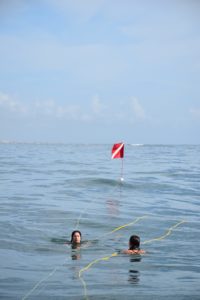
Students preparing to dive by putting out the dive buoy.
Alexandra Mercogliano-Wheeler
I majored in anthropology at the State University of New York at New Paltz. During this field season we are continuing last year’s excavation of the Anniversary Wreck. While this is not my first archaeology field school, it is my first maritime field school and it has been one of the best educational experiences of my life. Not only have I learned the key skills and methods of underwater archaeology, I have had the chance to meet some of the leading archaeologists in the field. I have made a lot friends along the way, many of them will likely be friends for life.
Two things make LAMP stand apart from the other field schools: St. Augustine’s diving conditions and LAMP’s research team. The scuba diving conditions off the coast of St. Augustine can be less than ideal due to low visibility and strong surges. The research team did an exemplary job preparing us to combat the challenges we would face while working at the bottom of the ocean. This combination makes LAMP’s field school one of the best for preparing students for their careers in maritime archaeology. I would recommend this maritime archaeology field school to anyone who is interested in the field.
Meagan Pennington
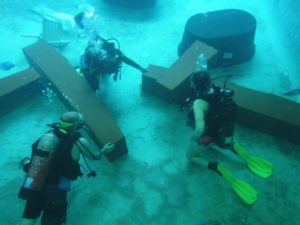
Students participate in obstacle course training before diving on actual wreck.
Some of the best moments during this 2017 field school experience with LAMP have come from everyone bonding at the field house over watching movies or sharing stories about the dive from that day. I have loved meeting the other students since they are from all over the United Sates and even Saudi Arabia! We have learned so many techniques useful in maritime archaeology like circle searches, target testing, and different types of knots. Some of the skills are applicable for future job opportunities. It has also been great listening to the lectures such as Capt. Thomas Anderson who spoke to us about aviation and space diving. It’s been a fun environment to work in since you have to get so close to your peers on a small space in a boat. Another favorite has probably been the blind obstacle course in the pool as preparation for diving on the wreck. I am very grateful of my time with all the amazing people I have met. P.S. Team 3 is the best!
Tyler Strobel
The diving community, while diverse, is generally calm and collected under pressure. This attitude, combined with the expertise of an archaeologist, made the resident archaeologists and field school supervisors easier to trust and respect as teachers. Suffice to say, the LAMP field school has changed how I view archaeology as a field. It has become easier for me to approach this field knowing that I feel welcome in the nautical archaeology community. I look forward to returning to the St. Augustine Lighthouse and to LAMP to continue work and volunteering in the future.
Leah Tavasi
Hello! My name is Leah Tavasi and I am a LAMP Field School student of the 2017 field season. I am originally from New Jersey, about 20 miles from New York City. In 2016, I graduated from McGill University in Montreal, Canada with a degree in psychology and a degree in classical history. I’ve been diving for over 10 years, during which time I worked my way to Divemaster in 2015. More recently, I’ve been training to become a scientific diver – this journey brought me here, to St. Augustine, Florida, and the lighthouse.
Blackout diving conditions and getting tangled in baselines, travel lines, transect lines, level lines, dredge hoses, hookah hoses, and other lines that don’t have names- this is what LAMP has taught me. Scientific diving has added rigor to an already strenuous sport – it forces the diver to really streamline themselves underwater in order to complete a task. To prepare us for this, LAMP took us through a blackout obstacle course in the early days of the field school. After being attacked with bungee cords and running into plastic alligators in a pool, the open ocean was significantly less daunting. We were given first-hand experiences with these conditions the very second we hit the dive site. The importance of carrying a dive knife was officially instilled upon me as a scientific diver. These new experiences made me more confident as a diver.
Thanks LAMP!
Kara Wallace
Coming to field school I had some experience with terrestrial archeology, but was just getting started as a diver. My most challenging and rewarding experience has been to learn how to navigate in murky conditions underwater at the site. My first dive down I was really disoriented by needing to rely on feeling around to be able to tell where I was in my environment. It takes a lot of patience with the understanding that all tasks will go slowly and it is easy to be confused as to what is happening at the bottom. What really gave me a better sense of how to navigate was submerging and then using the dredge hose by securing it to the bottom so that it could be easily found when we were ready to dig in the units. Feeling the dredge hose as a guide underwater was one of my favorite experiences because I started to feel more comfortable diving in low visibility and it was the first time I felt like we were close to beginning what all archaeology students love most – the discovery that comes with excavation.
Jessica Wentworth
I’ve personally learned many things about archaeological research and how it is conducted in the field. Target testing in blackout conditions (I love that we measure visibility in centimeters) and learning about and conducting circle searches helped me personally not only with scientific diving, but diving in general. What I’ve taken from this experience more than anything is the support of the people I’m surrounded by – not only the supervisors, but the other field school students. Everyone works together to make sure that we all understand what we need to be doing and that everyone is comfortable.
LAMP archaeologists aim to identify, investigate and preserve the physical remains of these and other aspects of our maritime heritage. Founded in 1999 and based at the St. Augustine Lighthouse and Museum, LAMP is one of the few independent maritime archaeological institutes not under the direction of a university or government agency. LAMP archaeologists manage an active research program, surveying inland and offshore waters to discover new shipwrecks and other archaeological sites, and overseeing diving and excavation operations to investigate and monitor those already known. In addition, LAMP is dedicated to public archaeology and maintains a robust program of public outreach and education. This includes ongoing speaking engagements, museum exhibits and training workshops, as well as the participation of volunteers at every stage of our operations from diving to lab work. Furthermore, LAMP strives to introduce youth to marine science through college internships and our high school maritime archaeological program.
